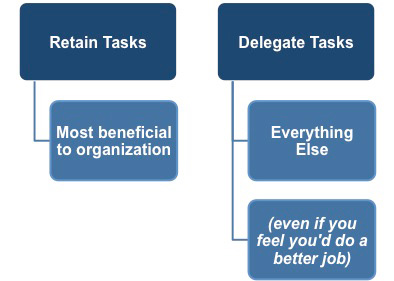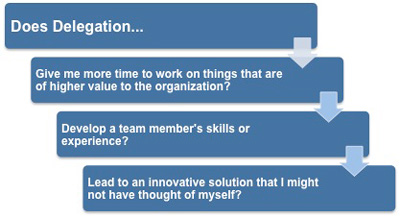Delegation of Authority
One of the most important management skills you can master is learning how to delegate. As a specific skill, delegation is one that becomes increasingly more important as you progress through levels of management and will greatly increase your own productivity. There is no other skill that will increase your productivity to the same degree as being able to delegate successfully.
That said, successful delegation does take time and effort, but the benefit it gives of actively helping employee involvement and empowerment succeed as a leadership style, is invaluable. When undertaken properly, delegation increases the level of motivation of team members as it allows for new and innovative ideas, which in turn leads to the development of team members' creative and decision-making skills.
In their groundbreaking book, Principles of Management, Harold Koontz and Cyril O'Donnell stated the following about delegation:
'Administrators must realize that there is a "comparative administrative advantage law", similar to the comparative economic advantage law that is applied to nations.
Comparative economic advantage states that each country will get richer if they export the product that is more efficiently manufactured, and they import the product that they manufacture less efficiently, even if they could produce said imported goods at a lower cost than any other nation.
Administrators can better contribute to the company if they focus on performing tasks that are more beneficial for achieving the objectives of the company, and they delegate to their subordinates all other activities, even if they could do a better job while working on said tasks.'
In other words, you should always concentrate your energies on those parts of your work that are the most advantageous to the organization and its development.
 |
All other tasks should be delegated to other individuals who are under your control. This philosophy should over-rule your belief that you could perform the task 'better' than those you've delegated it to.
Why Should I Delegate?
As a manager, you need to allocate as much time as possible to aiding the development of your business or service. This requires focusing a significant amount of your time on planning for the short-term and long-term needs of your organization; a strategy that in theory sounds good, but will undoubtedly in practice be replaced by any free time being overtaken with everyday operational tasks and problems.
Thus, if you can successfully reduce the amount of time you spend performing the latter, the more time you will have to dedicate to the growth and planning of your organization. Hence the importance of learning how to delegate.
One of the most effective and efficient ways you can achieve this is by delegating the disruptive operational tasks to someone else who is equally capable of performing this role. Indeed, a key aspect of delegating efficiently is to ensure that whilst your time is organized more effectively, tasks must be allocated to suitable people to minimize risks, and to ensure the optimum outcome. It also provides you with the opportunity to develop your team members by increasing their morale and motivation.
It is also key to remember that when delegating a task to other team members, you will retain the responsibility for it; all you are doing is assigning another person to perform the task on your behalf. It is often the fear that the delegated person will fail to perform the task properly (for which you will ultimately be responsible) that prevents managers from delegating.
Whilst delegation does contain an element of performance risk, the extent of the risk is dependent on the nature of the task and its importance to achieving organizational goals. To be an effective manager, you therefore need to control that risk of poor performance when you delegate a task.
The first step is to ascertain whether you are someone who is fearful of delegating. Common reasons for not delegating include:
• You're too busy.
• You can't trust anyone else to do the same quality job.
• No one has your ability.
• You would feel guilty passing your work on.
• The delegate's success may show you to be lacking.
• You are the only person capable of performing the task.
Using the excuse of 'being too busy' is often what people say when they are avoiding the issue of work overload. It shows insecurity on their part, which may be the result of a lack of confidence in anyone within their team being able to perform the task as well as them.
 |
It can also be seen as a reluctance on the manager's part to hand over any part of his work to another. This can be because it is one of the few aspects of their role they enjoy. Unfortunately, it shows poor leadership skills on the part of that manager and a lack of willingness to develop their own team. A good manager develops trust in the capabilities of his team and is always looking for ways to expand their skills and identify training opportunities.
Often managers are apprehensive about delegating tasks in case it reflects poorly on their own abilities and they therefore retain the task. This has implications for their ability to manage their workload and could increase levels of stress. Recognizing when you need help is a strength, not a weakness, and should not make you feel guilty about delegating.
In some cases, managers may also avoid delegating due to resentment at others being given credit for the successful completion of the task. This again shows not only poor managerial skills, but also a lack of suitability for a management role; a good manager will be proud of their team member's achievements and recognize the benefit for the whole team, rather than allowing jealousy to stand in the way.
When Should I Delegate?
One of the fundamental problems that people have when making the step up to management is the inability to appreciate that delegating is essential to their success. The belief that you could perform a better job of a particular task is not a valid reason for doing it yourself.
As a manager, you need to keep the bigger picture in mind of what your organization wants to achieve. When considering which tasks to delegate, there are some fundamental high-level factors you need to address.
You can do this by asking yourself 'If I delegate this task':
- Will it give me more time to focus on tasks that are of higher value to the organization?
- Will it allow me to develop the skills of one of my team by expanding their experience in this area?
- Will it offer someone with a fresh view of the task the chance to provide a more innovative solution than I would have done?
If the answer to any of these questions is 'yes,' then you should consider delegating the task.
 |
As an initial step it is best to delegate:
- Routine tasks.
- Planned tasks.
- Tasks that a team member has expressed an interest in performing.
For all of these, you should ensure that you have sufficient time within your workload to brief and explain exactly what is required. You must be mindful not to always delegate unpleasant tasks as this will not develop or motivate your staff.
It is also important to understand when you should not delegate. You should resist temptation to pass on tasks that have been delegated to you, as it is crucial to be able to control issues that arise and ensure they are resolved between you and the task owner. Delegation should also not be used as a strategy to handle last-minute tasks. The nature of such a task does not provide sufficient time for you to control the risks involved or to provide a sound brief.
This Successful Delegation Checklist outlines the correct process you should follow when delegating a task.
You may also be interested in:
Principles of Delegation | The Six Stages of Delegation | Delegation in Management | Monitoring Delegated Tasks | Advantages and Disadvantages of Delegation.
|
|
 |


